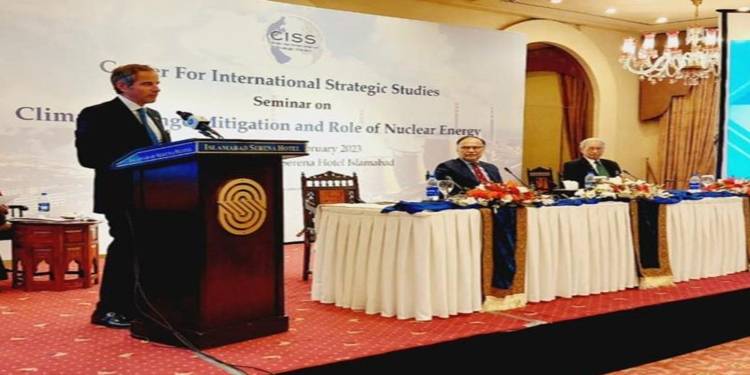
International Atomic Energy Agency (IAEA) Director General Rafael Mariano Grossi has acknowledged Pakistan's technical and engineering capacity for new nuclear power plants, including Small Modular Reactors, and said that Pakistan's nuclear safety is "world-class," Radio Pakistan reported.
The IAEA director general is in Pakistan on a two-day visit. Addressing a seminar in Islamabad, he said Pakistan's capacity for establishing new nuclear power plants indicates a promising future for nuclear energy and achieving Sustainable Development Goals.
He also said there is strong political support for new nuclear power plants in Pakistan.
Speaking on the occasion, Planning Minister Ahsan Iqbal said Pakistan has a mutually beneficial relationship with the IAEA that includes all areas of nuclear technology.
He stated that despite ranking as low as 158th among carbon-emitting countries, Pakistan is among the countries most severely affected by climate change.
He said Pakistan has achieved great milestones in nuclear science and technology for the socio-economic uplift of the country in areas such as cancer diagnosis and treatment, the development of disease-free and high-yield crop varieties, and food preservation.
The minister said nuclear power provides clean and cheap energy and currently contributes to eight percent of Pakistan's energy mix with six operational nuclear power plants.
He said Pakistan has an impeccable nuclear safety and security record and plans to develop more power plants.
Ahsan Iqbal said nuclear power is sustainable, clean, and a green source of energy in the overall energy mix, which also includes wind and solar power. He said it is the best solution to the challenge of climate change as well.
During his stay, IAEA Director General Grossi held meetings with Prime Minister Shehbaz Sharif and Foreign Minister Bilawal Bhutto-Zardari, where cooperation between the agency and Pakistan in several areas, including health, agriculture, industry, nuclear medicine, and power generation, came under discussion.

